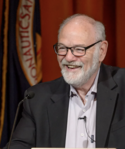Wendell Wallach: Re-envisioning Ethics: From Moral Machine to Extensive Regulation
PLENARY SESSION 1 | Tuesday, August 20, 12:30-14:00 | Auditorium 1 (1441-011)
WENDELL WALLACH
Wendell Wallach is the Carnegie-Uehiro fellow at Carnegie Council for Ethics in International Affairs, where he co-directs the Artificial Intelligence & Equality Initiative (AIEI). He is also Emeritus Chair of Technology and Ethics Studies at Yale University’s Interdisciplinary Center for Bioethics, a scholar with the Lincoln Center for Applied Ethics, a fellow at the Institute for Ethics & Emerging Technology, and a senior advisor to The Hastings Center. Wallach was founder and president of two computer consulting companies, Farpoint Solutions and Omnia Consulting Inc., but mainly works as academic scholar in bioethics and ethics of emerging technology. He wrote (together with Colin Allen) the first book on machine ethics, Moral Machines: Teaching Robots Right From Wrong (2009); since his awardwinning second book A Dangerous Master: How to Keep Technology from Slipping Beyond Our Control (2015), he is an internationally leading voice on robo-ethics and ethics of AI, relating philosophy with research and realities in international governance.
Abstract of lecture
Have we been underestimating the socio-technical challenges posed by ro(bot)s – physical systems and virtual bots? Many of the complexities inherent in managing intelligent systems can not be adequately met by scientific innovation, existing ethical constraints, or weak regulations forged by legislatures under the capture of the AI oligopoly. In spite of naive future projections, the science we have, and are likely to have in the near future, will not produce AI systems capable of making even satisfactory choices in complex situations where uncertainty reigns, multiple values converge, and the information available is inadequate to project meaningful consequences for various courses of action. AI will pose safety and security risks far beyond those being addressed by the pittance of investment presently directed to build trustworthy systems. Scientific humility is needed. Ethics must be reenvisioned and empowered to work through the plethora of socio-technical obstacles and trials ahead. A vast infrastruture to ensure AI safety will be required.
